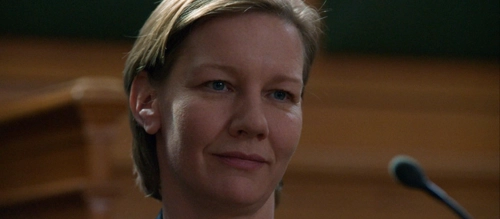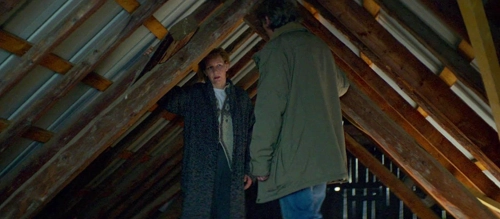Anatomy of a Fall (2023) Review

Anatomy of a Fall (2023)
Director: Justine Triet
Screenwriters: Justine Triet, Arthur Harari
Starring: Sandra Hüller, Samuel Theis, Milo Machado Graner, Swann Arlaud, Antoine Reinartz
Justine Triet unfolds entrenched systemic misogyny in her Oscar-nominated courtroom drama Anatomy of a Fall, a pointed and wordy multilingual picture that features one of the great performances of 2023.
French director and co-writer Triet became only the third woman in history to win the prestigious Cannes Palme d’Or back in May (following Jane Campion for The Piano and Julia Ducournau for Titane), an impressive feat made all the more staggering by the film’s presentation being largely told through a language she is not a native speaker of, English. Using a cast made up of mostly French actors, and headlined by arguably Europe’s greatest actress of the past decade, Sandra Hüller (a German), there isn’t an inflection missed, a line off-beat, an interruption out of tempo, in this tale of a woman’s attempts to defend herself from charges of murder. Triet approaches the written word as if with the same surgical precision as a prosecutor would a defendant, as a crime scene investigator might a blood splatter, and it ensures that every development of this story, every minor piece of the puzzle that is the murder/suicide case, can be analysed, judged, and deconstructed as if real-life, asking us to question what (or more pertinently who) we believe. We are the court of public opinion, our voyeuristic attitude to true crime at first exploited and then questioned by a filmmaker drawing outside of the lines.
At its core, Anatomy of a Fall is like all mystery courtroom dramas. There’s a character we are brought to understand, to analyse, to dissect, and there’s a crime/accident that they may or may not be found guilty of. It’s a simple structure that presents a death, then a court case, then a resolution, but unlike many of the Hollywood courtroom pieces that have glorified our voyeuristic attitudes and celebrated us for recognising the murderers from the innocents (especially if we can figure it out before the reveal), Anatomy of a Fall has a different purpose. This isn’t about whodunnit, or even why they did or didn’t do it, it’s about why we’re invited into these cases in the first place and why women in particular suffer at the hands of a cultural gender bias that is so weighted against them that they can come under threat for simply existing. This is about womanhood in a world built for men.

Sandra Hüller, who is nominated for Leading Actress at both the BAFTAs and Oscars for her performance in this film (and is also nominated in the Supporting Actress category at the BAFTAs for her role in The Zone of Interest), is truly remarkable as the anchor around which all of these intentions are presented. She is powerful, vulnerable, guilty, not guilty, harsh, soft; all of the things that make a character feel like a real person. Her character (also Sandra) is written tremendously well, and Triet does a phenomenal job of framing her narrative in such a way that we feel put on trial for invading so much of her private life to reach some kind of truth for the sake of our entertainment, but Hüller’s performance is so packed with force and energy that there’s enough to lead three separate films. One particularly long dialogue exchange, presenting an argument between Sandra and her husband (Samuel Theis) days before his death, features perhaps the greatest acting of all cinema in 2023, Hüller standing out even in her two-person scene as a deeply studied character actor rooting melodrama in reality to such success that you begin to feel uncomfortable watching her. She transforms some of the best dialogue of the year from the specificity of its poetry into something human and real, making what could be a stage-like powerhouse scene into a deeply relatable, realistic, and human moment.
Hüller’s Sandra is a woman seemingly excommunicated from her surroundings, her German nationality and accent presented in contrast to the French-speaking cast of supporting acts, her house in the middle of a snow-covered park, her face exclusively in the frame for much of the film. She is isolated, perhaps under a microscope, and we delve deeper and deeper until it becomes uncomfortable, then watch as what we find “normal” about courtroom dramas and courtrooms as a whole is put on trial beside our own perspectives, the lasting thought being one of our collective unkindness and the everyday sexism that can be so dangerous to women, no matter their wealth, status or celebrity.
There is some phenomenal shot construction, there are meaningful cinematography choices, and the score is of a noticeably high quality, but perhaps because of how the film has such tightly defined genre conventions or because the writing, direction and acting take up so much space, you hardly begin to wonder about how cinematic this film is. Instead, you are pulled through the weeds of a relationship and then put into the spotlight, at first to assume the verdict and then to be chastised for creating one. This is meaningful cinema from a woman at a time in which women’s issues are more at the forefront of our social conscience than ever, and thus a timely and tremendously well-executed commentary on our era that will retain relevance so long as people continue to stand trial. This isn’t as pretty as Poor Things or as relentless as Oppenheimer, but it is layered and artistic filmmaking presented with great intent by all involved; a thought-provoking piece.
Score: 20/24

